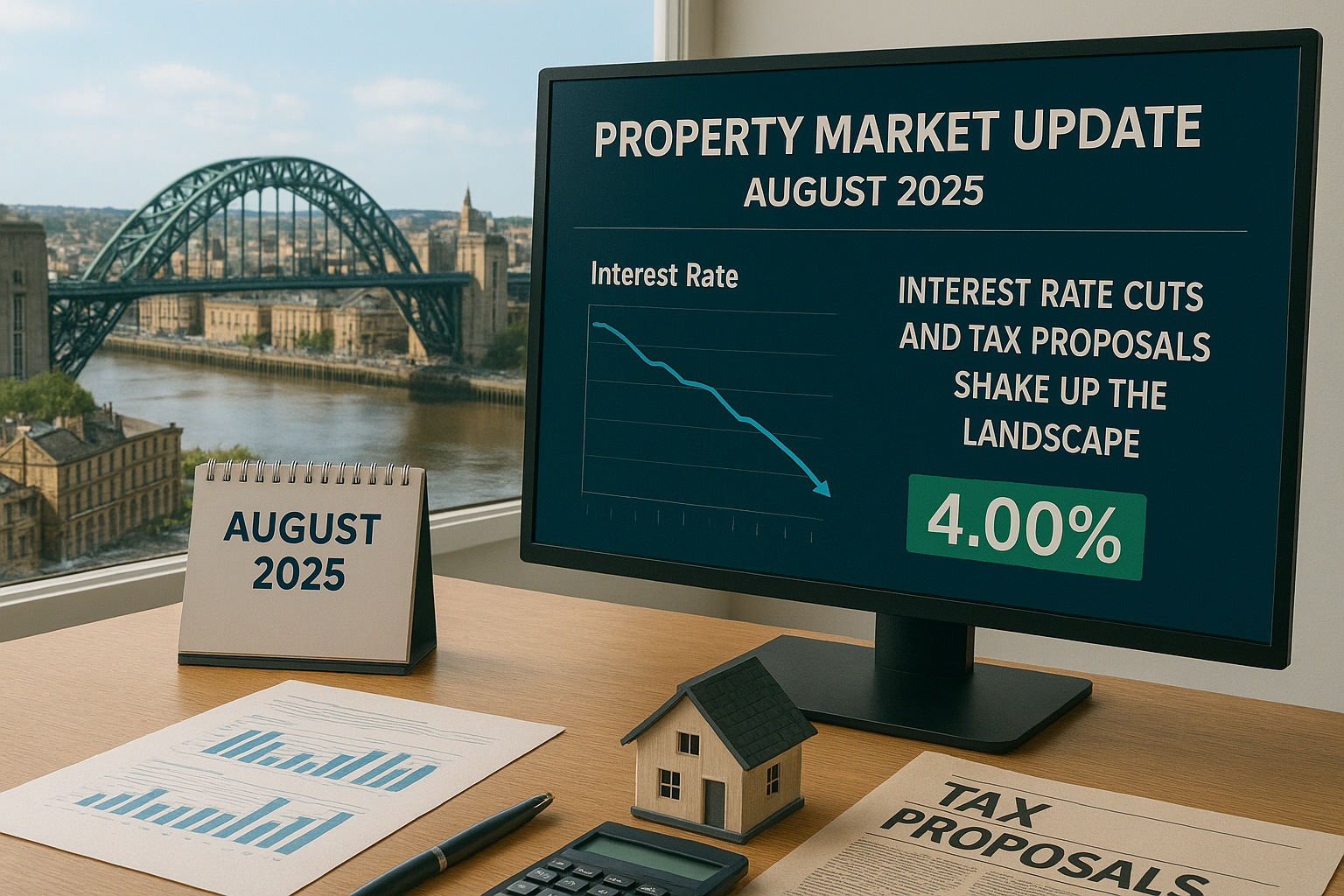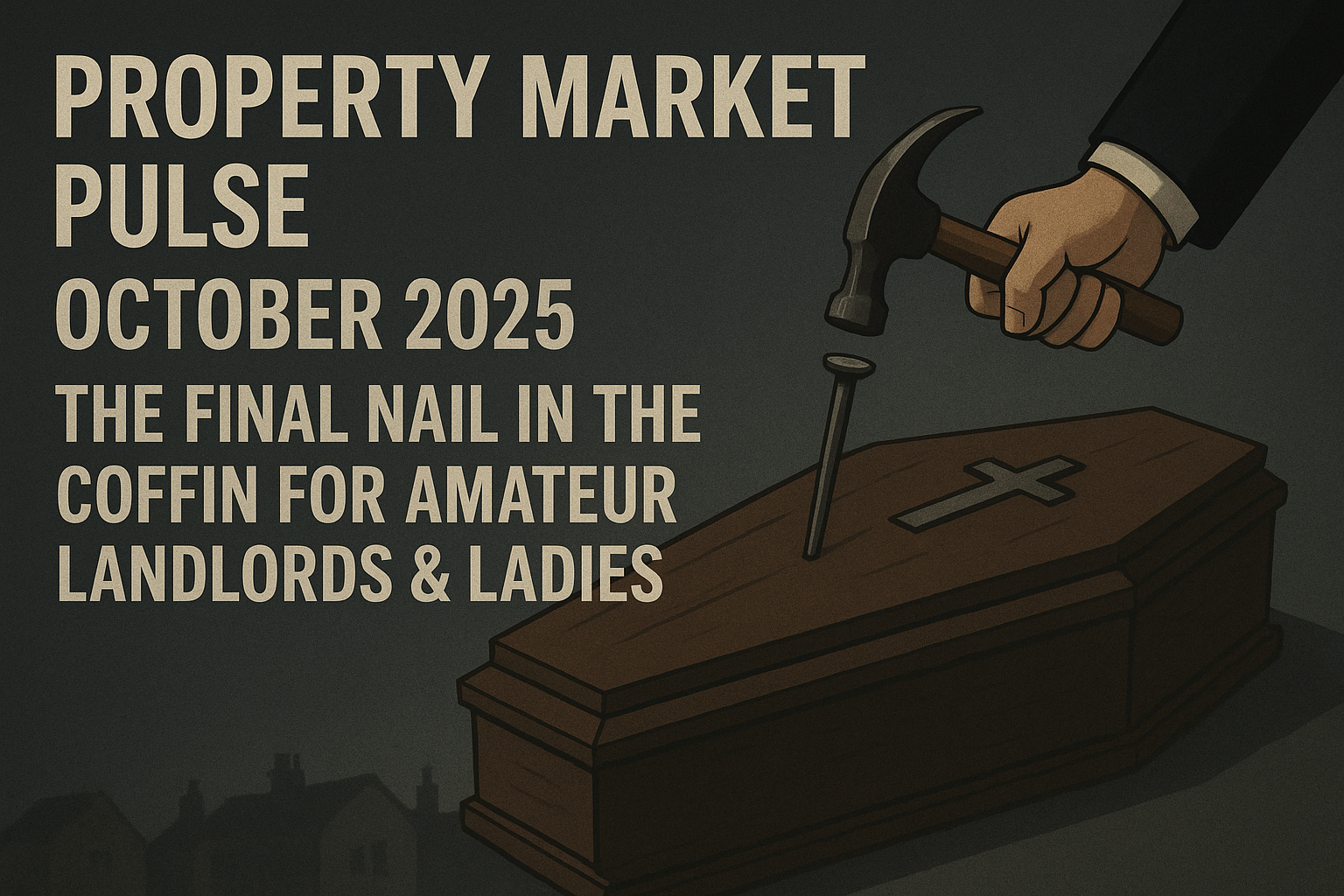Property Market Update August 2025: Interest Rate Cuts and Tax Proposals Shake Up the Landscape

Most landlords are holding their breath.
The property market is shifting beneath our feet.
With interest rates falling and new tax proposals looming, August 2025 brings both opportunities and challenges for property investors across the UK.

Interest Rates Finally Drop
The Bank of England has cut the Bank Rate to 4.00%, down from 4.25%. This marks the first reduction since the hiking cycle began in late 2021.
But here's the interesting part...
The decision wasn't straightforward. The Monetary Policy Committee was deeply divided, requiring a rare two-round vote. The final tally showed 5 members in favour of the cut, with 4 preferring no change. One member had initially pushed for a larger 0.50 percentage point reduction.
This split decision suggests uncertainty about the economic outlook, even among the experts.
What does this mean for property investors?
Lower interest rates typically reduce mortgage costs, potentially improving cash flow for leveraged property investments. For our investors at Chant Properties, this could mean better returns on future acquisitions.
Affordability Improves for First-Time Buyers
There's good news on the affordability front.
House prices are now 5.75 times the average income – the lowest level in over a decade. This improved affordability has helped support a rebound in the market.
For property investors, this creates an interesting dynamic:
- More first-time buyers are entering the market
- Potential for capital appreciation as demand increases
- Opportunity to acquire properties in areas with strong growth potential
Landlord Income Insights
Did you know only 5% of landlords earn a gross income over £50,000?
This statistic highlights an important reality: most landlords aren't the wealthy property tycoons often portrayed in the media. The majority are everyday people supplementing their income through property investment.
At Chant Properties, we've always focused on creating sustainable returns for our investors, regardless of market conditions.
Political Drama Affects the Property Market
On 7 August 2025, Rushanara Ali resigned as Minister for Homelessness following controversy over her own property dealings.
Reports revealed she had evicted four tenants from a property she owned and, after failing to sell it, re-let it for approximately £700 more per month – increasing the rent from around £3,300 to £4,000.
The irony wasn't lost on landlords across the country.
This situation highlights the complex relationship between politics and property, and the challenges of balancing tenant protection with landlord rights.
Concerning Tax Proposals for Landlords
The most worrying development for property investors comes in the form of potential tax changes:
National Insurance on Rental Income
Officials are considering applying National Insurance contributions to rental income – essentially a new tax on landlords. This move aims to plug a £40 billion fiscal gap and could raise approximately £2 billion.
Capital Gains Tax on High-Value Home Sales
There's also discussion about potentially taxing home sales over £500,000, possibly replacing stamp duty and council tax with national or local property taxes.
These proposals have understandably stirred up anger among UK landlords. Many are already dealing with increased regulation and costs.
Companies House Identity Verification
From 18 November 2025, Companies House will implement mandatory identity verification:
- New directors will need to verify their identity to incorporate a company or join an existing one
- Existing directors must confirm identity verification when filing their next annual confirmation statement
- Existing PSCs (People with Significant Control) will need to verify their identity within 12 months of the 18 November commencement date
This change aims to increase transparency and reduce fraud in the UK business environment.
Our Take on the Current Situation
The property market feels like it's in a holding pattern.
Everyone seems to be waiting for the Renters Rights Reform to come into effect before making major decisions. The budget proposals for early November have created additional uncertainty.
At Chant Properties, we're monitoring these developments closely. Our approach remains focused on:
- Identifying value-add opportunities in the North East
- Maintaining strong returns for our investors
- Adapting our strategy to navigate regulatory changes
Despite the challenges, we continue to see strong potential in the Northern property market, particularly in Newcastle and surrounding areas.
What This Means for Investors
If you're currently investing in property or considering it, here's what you should keep in mind:
- The interest rate cut provides some relief for mortgage holders
- Potential tax changes could impact returns – diversification remains important
- Improved affordability may create opportunities in certain market segments
- Regulatory changes require staying informed and adaptable
Looking Forward
The coming months will be crucial for property investors. The November budget will likely provide clarity on the proposed tax changes, while the implementation of the Renters Rights Reform will reshape the landlord-tenant relationship.
At Chant Properties, we're here to help you navigate these changes. Our experience and straight-talking approach mean you'll always get honest advice about the market and investment opportunities.
Want to discuss how these changes might affect your property investment strategy? Get in touch for a friendly chat.
This blog post was written by Chris and Anthony Hunter, founders of Chant Properties Ltd. The information provided is based on market data available as of August 2025 and represents our current understanding of the property market. Always seek professional advice before making investment decisions.
Sources:
Bank of England
The Guardian
Savills
GOV.UK
Please fact-check all information before publishing, particularly the statistics, dates, and specific details about policy changes.





